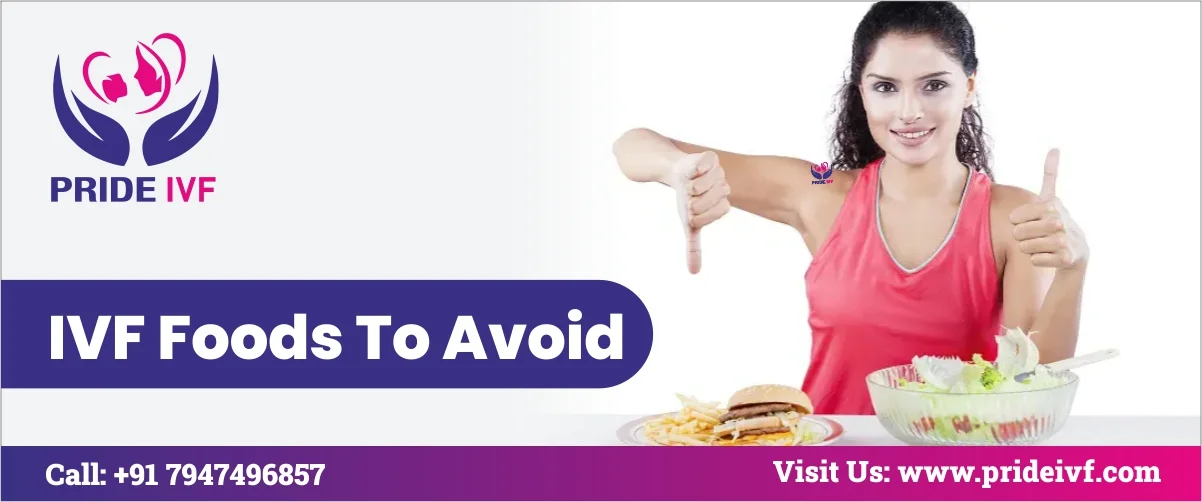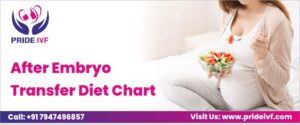With growing cases of infertility, couples across the globe are increasingly considering In Vitro Fertilisation (IVF) to experience parenthood. While IVF accompanies a high success rate, several factors impact its outcomes. Among several other factors, nutrition significantly impacts the IVF success rate in india. The proper dietary habits, which include eating a balanced diet and choosing the right foods to eat, are very important to ensure viable IVF outcomes with minimal complications. But what’s even more important is to have knowledge of the IVF foods to avoid. Read on to understand how IVF works, the impact of nutrition on IVF, and the foods to avoid for IVF success.




What is IVF?
An Artificial Reproductive Technology (ART) procedure called In Vitro Fertilization, or IVF, helps individuals or couples live their dream of parenthood. This process involves taking a woman’s fully matured eggs from her ovaries and fertilizing them in a lab with sperm from a donor or male partner. The developed embryos are then put back into the uterus, where the baby develops.
Men and women who are having trouble getting pregnant are thought to have a chance with IVF. Irrespective of the high success rates that IVF accompanies compared to other ART techniques, the results vary depending on a number of factors, such as the woman’s age, the quality of the eggs, eggs, and embryos, her lifestyle, and a range of other factors. To ensure a successful IVF procedure, it’s important to follow the doctor’s suggestions concerning lifestyle changes, especially nutritional intake.
What is the Role of Nutrition in IVF?
Nutrition has a vital role to play in IVF. Nutrition, in addition to other factors, can impact IVF outcomes. Therefore, eating the right foods and getting adequate nutrition is essential. Fulfilling the body’s nutritional requirements can help optimise fertility and pave the way for a healthy pregnancy. A balanced diet comprising all the essential vitamins, minerals, antioxidants, and healthy fats is important for proper reproductive health- a requisite for successful IVF. Pride IVF also guide their patients with indian diet plan for ivf success. Foods containing folate, iron, and vitamin D are considered healthy for improving egg quality and promoting the development of healthy embryos. For better understanding go through after embryo transfer diet chart. Omega 3 Fatty Acids, on the other hand, improve reproductive function and increase chances of implantation.
Nutrition is also important for maintaining healthy weight during the process. A healthy weight is linked with successful chances of conception through IVF. Avoiding processed foods, and other harmful substances is essential to ensure successful procedure outcomes.
Lets get started
IVF Foods to Avoid to Ensure Successful Outcomes
In addition to knowing what to eat during the IVF process, you must also know the foods to avoid during IVF. There are several foods that can hinder the IVF process and affect the outcomes. Understanding which foods to avoid can help ensure IVF success.
Here are foods to avoid during IVF for successful outcomes:
- Processed Foods: Processed foods, especially sugars, can impact how the body functions. Foods that contain processed sugar, such as candies, cookies, etc, can affect the body, including reproductive health, causing issues with IVF outcomes.
- High-Mercury Fish: Fish with high mercury content, such as swordfish, shark, king mackerel, barramundi, and gemfish, can impact fertility and, in turn, the success of IVF.
- Trans Fats: Foods that have high trans fats can cause inflammation in the body and cause hormonal disruption. These foods include processed snacks, fried foods, etc.
- Caffeine: Products with caffeine can impact fertility, making you more prone to experiencing a miscarriage after IVF. Drinking more than 2 cups of tea or coffee can affect the chances of successful IVF and should, therefore, be avoided.
- Soy Products: During the IVF process, it’s best to avoid soy as they contain phytoestrogens. Phytoestrogen may impact hormone levels as well as reproductive function.
- Raw or Undercooked Eggs: You must not consume raw or undercooked eggs during your IVF cycle. Consuming raw or undercooked eggs or products containing them may increase your risk of foodborne diseases.
- Refined Grains: You must limit the amount of refined grains you consume. These include white rice, bread, and pasta. They are linked to increasing blood sugar levels and causing insulin resistance.
- Artificial Sweeteners: Artificial sweeteners, like sucralose, are known to impact fertility and affect the chances of successful IVF outcomes.
- High-Sodium Foods: Consumption of foods with high sodium content must be avoided, as they are linked with decreased chances of IVF success.
- Unpasteurized Dairy Products: Unpasteurized dairy products may contain harmful bacteria, which can increase the risk of foodborne diseases that may impact fertility.
- Alcohol: Alcohol affects sperm and egg production. Therefore, you must stop drinking if you’re undergoing IVF.
Best Diet Practices To Ensure IVF Success
Here are the best dietary practices to follow during the IVF process to optimise the outcomes:
- Eat a Balanced Diet: Eat a diet rich in all the essential nutrients. These include fruits, vegetables, whole grains, lean proteins, and healthy fats. This can help boost fertility and increase the chances of successful IVF.
- Eat Foods that Improve Fertility: Increase your intake of foods that help improve fertility. These include leafy vegetables, nuts, berries, oily fish, etc.
- Avoid Processed & Food: It’s important to avoid junk and processed food, such as beverages and snacks with high sugar content, as they accompany the risk of inflammation in the body.
- Consider Healthcare Supplements: To meet your nutritional requirements, the doctor may suggest you to take some health supplements. However, you must take it with the doctor’s recommendation only. These might increase chances of successful IVF.
Conclusion
Understanding the role of nutrition in IVF success is essential to ensure minimal complications and favourable outcomes. Learning about the foods to eat and avoid is necessary to ensure your efforts don’t go in vain and your path to parenthood becomes seamless. Consult your fertility specialist to get an understanding of the best practices to optimise IVF success. They will be able to provide you with the best solutions with the least risk of adverse effects.




